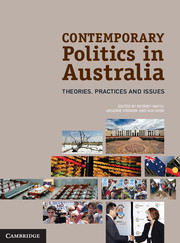Book contents
- Frontmatter
- Contents
- Tables and figures
- Contributors
- Acknowledgements
- Introduction
- I Contemporary Theories of Australian Politics
- Part II Politics in Everyday Australian Life
- Introduction to Part II
- 7 Political values and attitudes
- 8 Political socialisation
- 9 Media politics
- 10 Politics in Australian culture
- Part III Elections
- Part IV Participation and Representation
- Part V Inside the Australian State
- Part VI Contemporary Public Controversies
- Glossary
- References
- Index
- References
10 - Politics in Australian culture
from Part II - Politics in Everyday Australian Life
Published online by Cambridge University Press: 05 June 2012
- Frontmatter
- Contents
- Tables and figures
- Contributors
- Acknowledgements
- Introduction
- I Contemporary Theories of Australian Politics
- Part II Politics in Everyday Australian Life
- Introduction to Part II
- 7 Political values and attitudes
- 8 Political socialisation
- 9 Media politics
- 10 Politics in Australian culture
- Part III Elections
- Part IV Participation and Representation
- Part V Inside the Australian State
- Part VI Contemporary Public Controversies
- Glossary
- References
- Index
- References
Summary
The idea that politics occurs in cultural spaces is one that makes most sense when viewed in the light of discourse theories and post-structuralism (Chapter 5). Treating cultural spaces as political spaces is important for extending the spaces of participation addressed in some democratic theories (Chapter 1). On this view, enhancing democracy requires opening up both cultural and political spaces to increased participation. These spaces are also important to the production of the gender stereotypes that feminists criticise (see Chapter 4). Treating cultural spaces as sites of politics significantly extends the political behaviour that is the focus of interest of those who study politics. So behaviouralists might recognise an implicit challenge in this chapter to extend their notions of ‘political’ behaviour (see Chapter 3). A deeper challenge, though, confronts institutionalists (Chapter 2), who are even less likely to recognise the cultural spaces discussed here as political spaces. International politics theorists (Chapter 6) are likely to see the cultural patterns here as both the result of, and as contributing to, Australia’s place in the world.
- Type
- Chapter
- Information
- Contemporary Politics in AustraliaTheories, Practices and Issues, pp. 106 - 116Publisher: Cambridge University PressPrint publication year: 2012



